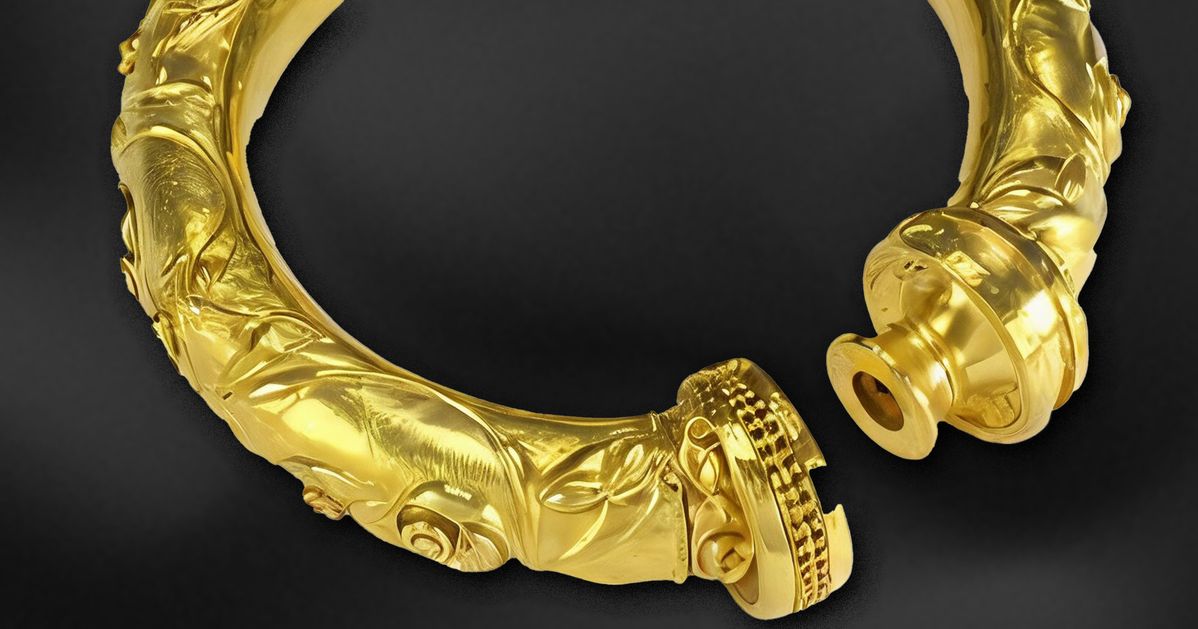Two unsuspecting Irish farmers, working their muddy field in 1896, struck what appeared at first glance to be insignificant metal objects. Their chance discovery would soon be recognized as the most spectacular precious metals find in Irish history, a golden treasure worth millions that had lain hidden beneath their land for centuries.

The Broighter Hoard wasn’t just any collection of ancient gold – it was a treasure trove that would revolutionize our understanding of Iron Age metallurgy and international trade. This wasn’t merely a few coins or a simple bracelet.
The discovery revealed an astonishing collection of masterwork pieces including a detailed golden boat complete with tiny oars, an intricately crafted torc that would make modern jewelers weep, and evidence of sophisticated precious metals trading networks that spanned the ancient world.
For today’s bullion collectors and precious metals enthusiasts, this discovery provides fascinating insights into how our ancestors valued, traded, and crafted gold over 2,000 years ago.
A Farmer’s Lucky Day: When Agricultural Tools Struck Precious Metals
On a crisp February morning in 1896, farmers Thomas Nicholl and James Morrow were plowing their field near Limavady, Ireland, about 14 inches deep in the rich soil near Lough Foyle. Their ordinary day took an extraordinary turn when their plow struck something metallic.
Initially not recognizing the golden artifacts, they had unknowingly uncovered what would become known as the Broighter Gold Collection – one of the most significant precious metals finds in Irish history. The discovery location, whose name “Broighter” comes from the Irish “Brú Íochtair” meaning “lower fort,” would later fuel fascinating theories about its connection to ancient Celtic sea gods.
Investment-Grade Ancient Gold: A Collector’s Dream Find
The centerpiece of this Iron Age collection is a remarkably detailed miniature boat, crafted from 3 ounces of pure gold (worth approximately value of gold @ 3 oz at today’s spot price). This exquisite vessel, measuring 7.25 inches long and 3 inches wide, showcases the extraordinary skill of Iron Age craftsmen.

The boat features two rows of nine oars, functional rowlocks, a paddle rudder, and miniature tools including forks, a yardarm, and a spear. Despite being damaged during its discovery, the boat’s preservation allows us to appreciate the incredible detail work that went into creating such a masterpiece with the relatively primitive tools available in the 1st century BC.
The Ultimate Bullion Artifact: A Masterpiece Torc
The collection’s crowning glory is the torc – a hollow gold collar that represents the absolute pinnacle of Iron Age metalworking. Measuring 7.5 inches in diameter with a tube thickness of 1.125 inches, this piece showcases the sophisticated La Tène style of Celtic art.

The torc features an ingenious mortice and tenon fastening system with a “T” piece that made it wearable. Its surface is adorned with precisely executed bird and horse motifs, demonstrating that our ancestors understood something modern precious metals investors know well: true value lies in both the metal and the artistry. The craftsmanship is so exceptional that it remains unmatched among Irish artifacts of its era, earning it a place on the 1996 Northern Ireland pound note.
Ancient Precious Metals Trading: Global Markets in the Iron Age
What makes this collection particularly fascinating for modern bullion enthusiasts is how it demonstrates ancient precious metals trading networks. The hoard contains pieces from across the ancient world – the chain necklaces, crafted using the sophisticated loop-in-loop technique dating back to 2500 BC, show clear Roman and Etruscan influence.

The British bar torcs, one complete at 18.6 cm diameter, were imported from southeastern England. This diversity of origins, despite the gold’s consistent source, reveals that even in the 1st century BC, gold was a globally traded commodity with established international markets and craft techniques being shared across vast distances.
Gold Investment Through the Ages: The Ceremonial Bowl
The collection includes a golden bowl measuring 3.5 inches in diameter and 2 inches deep, weighing over one troy ounce (currently valued at about value of gold @ 1 oz). While modest in size, this vessel features four suspension loops and was likely a model of the larger cauldrons central to Celtic feasting rituals.

Crafted from a single sheet of gold, it represents the height of metallurgical skill for its time. For modern precious metals collectors, it demonstrates how ancient craftsmen could transform raw gold into items of both practical and ceremonial significance, while maintaining the metal’s intrinsic value.
Modern Bullion Value Perspective
The collection’s journey to its current home twisted through legal battles and cultural disputes. Initially sold to a local jeweler, it eventually reached the British Museum for £600 – equivalent to £74,400 in today’s money.
A landmark court case in 1903, argued by Sir Edward Carson himself, determined the hoard’s fate. Interestingly, Tom Nicholl, one of the discoverers, used his court appearance per diem to pay for his wedding but never saw the cleaned and restored collection before his death in 1964 at age 91.
Where is the Broighter Collection Now?
The Broighter Gold Collection now resides in the National Museum of Ireland in Dublin, with replicas at the Ulster Museum in Belfast.
The collection occasionally returns to Limavady for special exhibitions, though the boat is now so delicate it can only be displayed as a hologram – a modern solution for preserving an ancient treasure.
Note: All modern valuations are calculated using current spot prices accurate to today’s value and updated in live time. Historical weights have been converted to troy ounces.






